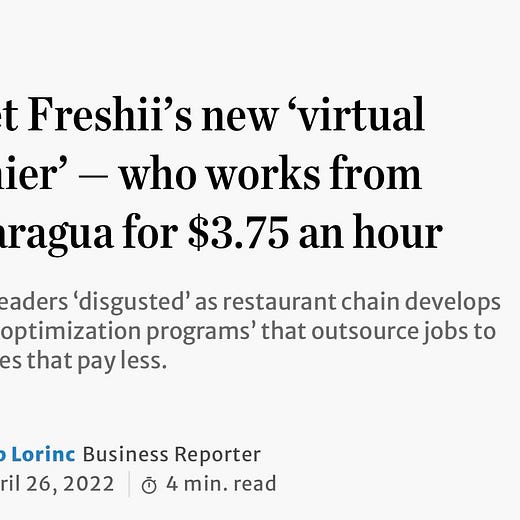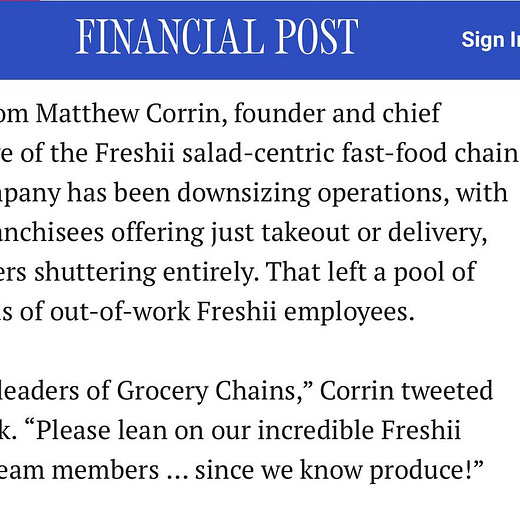🥗 the real fresh(ii) problem
🎰 spoiler: no policy tools
A few months ago, Freshii (a fast casual restaurant) quickly and casually reminded us of our policy powerlessness when technology sort of replaces a worker.
Occasionally chatbots are introduced in a customer service context as a labour-saving tactic that mimics a real-life worker and triages needs. The program recently introduced at Freshii franchises is a virtual cashier that substitutes a live, in-person interaction with a live, digital interaction with a worker that is in Nicaragua.
Early iterations of the ongoing future of work conversation were characterised by a sort of hysteria that asked whether a ‘robot’ was coming for your job. Assessments were conducted that considered different sectors’ vulnerabilities to looming automation and a body of inquiry organised around the ‘future of work’ became better established.
Since then, analysis has demonstrated that most often, technological advances are complementary to a worker; perhaps automating away time-consuming chores and freeing up time to devote to more complex, higher-value tasks. Other times, a technological advance may even create more, highly-skilled jobs (making jobs instead of taking them). Both of these outcomes are promising and suggest that automation is less of a threat than initially conceived.
Nonetheless, the raw, direct substitution of a human with a machine remains jarring, even though it is still familiar. For instance, the addition of self-checkout options at Shoppers Drug Mart locations is a subtle way that tech is incrementally replacing human staff, who may now be shifted to other in-store duties.
The worst - and best, most mind-boggling - element of Freshii’s virtual cashier is that the human is not invisible or just working somewhere else in the store. Their face is literally in yours - just on a screen. The intervention represents a digital offshoring that visibly maintains a human in the customer’s loop. The only difference from the outsourcing popularised in the ‘90s is this surreal virtual trace, which is not unlike a Zoom or Teams meeting with a service worker.
In that way, the virtual cashiers could be considered an extension of the ‘work from anywhere’ liberation that many white collar workers have enjoyed since the onset of the pandemic. Except that the cashiers aren’t working from the safety of their own homes locally, they are overseas and earn about $3.75 (US) an hour. This is more than double the local minimum wage for the workers, and far below Ontario’s floor.
The maintenance of a human in this digital infrastructure is intriguing. One of the founders of Freshii is now pursuing the growth of a company called “Percy,” which offers a video-calling device attached to cash registers for franchises. Ostensibly this can help to solve current challenges attracting and retaining low-wage labour. But in a technological disruption context, it’s also pretty perplexing. For instance, why not have customers self-order via an app? Or why not program a simple chatbot to engage a customer (is this too expensive)? Perhaps initial user-testing revealed that people maintain a self-stated preference for service from humans, and this is the compromise. Or maybe it’s just the minimum viable product to save money on labour; i.e. it’s cheaper, easier, and faster to engage an off-shore human than write proprietary code to help people order salads.
Initial media coverage of the Freshii cashiers incited a mix of frustration and marvel. The role for public policy intervention - if any - remains unclear. A few years ago, Microsoft founder Bill Gates was ridiculed for his wildcard that firms should be taxed on robotics as a mechanism to fund other types of employment. While National Post columnist Colby Cosh suggested that the outrage over Percy was ‘misguided,’ and Globe and Mail columnist Robyn Urback suggested we ‘just don’t like being forced to see it happen,’ maybe the most uncomfortable aspect of digital offshoring and virtual cashiers is that policy people are confronted with the reality that we do not seem to have any viable tools to respond to such substitution. Instead we sit back and watch.
There are many other instances where the human is taken out of the loop through an automation process, and perhaps the virtual cashier is simply an intermediary step. For instance, some online commenters are calling for more ubiquitous speed cameras around the City of Toronto that can automatically issue tickets without verification from an employee.
The current correction will smooth the pathway for more firms to substitute in-person humans with cheaper workers, under the guise of current labour issues. It is worth noting that this technology is not a product of the pandemic. If it was, it could have better protected front-line workers that risked (and continue to risk) contact with the COVID-19 virus through their work more effectively than a slab of plexiglass. I note that the Percy cashiers are working from a call centre, not their home.
We may see that a human is ‘sticky’ in some regard when it comes to the service industry. While the Freshii’s virtual cashier is at once innovative and seems supremely lazy, it offers a tacit and comforting acknowledgment that people may still want to engage with a human. One could also argue that the well-being of these Central American workers is of equal value to the well-being of Canadian workers - though there is nothing that Freshii has done to credibly indicate that they are motivated by any sort of global moral philosophy.
All I know is that I want to tap a screen and order a better policy response for the workers that have been displaced by this gross digital off-shoring but there doesn’t seem to be anything that I can press. This is a problem. An even bigger problem would be if the Freshii cashiers invite us to mentally ‘check out’ of better supporting workers whose labour is automated away or eagerly accepting the transition to save a few bucks at lunch.









